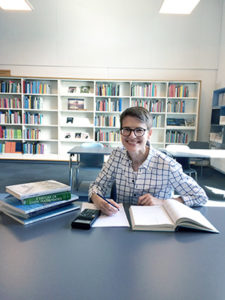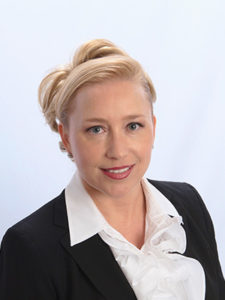IU East’s online mathematics graduates have a global variety of goals, backgrounds
The good word certainly has gotten around about Indiana University East’s expanding – and acclaimed – online mathematics program.
Around town.

Zoe Asta of Augustenborg, Denmark, completed her Bachelor of Science in Mathematics from IU East online. She is a 2020 graduate. Asta is continuing her education and is now enrolled in IU East’s Graduate Certificate in Mathematics online program as she continues to work as a full-time librarian and math tutor.
Around the country.
Around the world.
That’s right, the world. Online math students hail from countries like Denmark, Italy and Russia.
They come from Washington state and Washington, D.C. They come from the Navajo Nation and from numerous towns in eastern Indiana and western Ohio.
Zoe Skovgaard Asta earned her bachelor’s degree and now is working toward a master’s certificate in math from more than 4,000 miles away. The librarian scoured the Internet for information to find her perfect match.
“It was important for me to get the degree from a university with a good reputation, especially if I wanted to use the degree as a basis for further study in Denmark, where I live.”
Mary Evanston, who lives near Washington, D.C., joined Asta in earning a bachelor’s degree in 2020.
“I did extensive online research on different online math degrees,” said Evanston.
Her degree immediately helped her qualify for the engineering master’s program at the Johns Hopkins University Whiting School of Engineering in Artificial Intelligence.
Evanston’s best bachelor’s degree choices came down to IU East and a well-known online program based in New Hampshire. “I had an excellent onboarding experience at IU East,” she said. “Everyone treated me with respect and I was always able to get my questions answered quickly and efficiently.”
Online students do a lot of research about the program before they call or email our admissions office for the first time, says Markus Pomper, department chair and associate professor of mathematics at IU East.

Mary Evanston is from the Washington, D.C. area and graduated in May 2020 with her Bachelor of Science in Mathematics from IU East. She continues to work as a federal business development executive while working on her graduate degree in Artificial Intelligence at Johns Hopkins University Whiting School of Engineering.
“They find us through Internet searches. The students interested in the math program have done their homework,” Pomper said. “They know why they want to be here. Their questions are very specific.”
It takes teamwork to provide the answers. “We work very closely with the admission’s office to get the answers they need. That’s been working well,” Pomper said.
Coincidentally, both Evanston and Asta are 53 years old and had previous undergraduate efforts in math that had not worked out. “My motivation was simply to finish my degree,” Evanston said about joining IU East’s program. “However, after starting, I saw a path to improve my career by making the program a basis for a graduate degree.”
Asta’s motivation for starting at IU East two years ago was to qualify for a higher role in the library field or a move into the education field. She had begun her math-degree quest in the online Harvard Extension School, but discovered after completing four classes that she would not qualify for a bachelor’s degree there because she had earned one previously.
“I began looking for other options,” she said. “There weren’t many that met my needs and of the few out there, IU East looked like the most reputable program, so I applied.”
She is happy that she did. So is Evanston.
The positive experiences – the personal connections and the positive reinforcement from instructors – helped convince Asta to continue on through IU East.
“I have just started in the online Graduate Certificate Program in Mathematics,” Asta said, “and am still considering whether or not to pursue new avenues in my present profession or a move to the teaching profession.”
Asta and Evanston are examples of why IU East’s online math program has exploded in growth from nine in 2009 to 350 today in its B.S. and B.A. programs.
Expect that growth to continue. One reason is the current pandemic, which has made it a necessity for many more degree-seeking students around the world to take classes online.
Another more fundamental reason is that the program keeps adapting, and keeps looking forward.
Pomper said there is a new emphasis on creating a community of students by addressing the challenges that students face with an online math program. IU East’s faculty will aim to provide better feedback on individual and group assignments.
For example, Pomper keeps regular office hours over Zoom for students to join to work through math problems.
The pandemic nearly derailed Evanston’s final semester, but she persevered with help from Pomper.
There are numerous other examples for IU East of the success of the online program: the new graduate from the Navajo Reservation, the 16-year-old from Washington state, the soldiers and spouses who must always be ready to move locations.
The examples also include high positions in state and national rankings.
The reasons for attending vary, of course, but flexibility is an essential ingredient to the success of the program. So are making personal connections.
“The best experiences for me were classes that involved a lot of student and professor participation on the forums, Zoom presentations by students and online office hours,” Asta said.
She and Evanston explore the flexibility, the connections and their futures in more detail in the following Q&A. They provided answers via email.
Question: What was your motivation for earning a degree in mathematics?
Asta: I had a couple of reasons for pursuing a degree in mathematics. The most important reason was pure love of the subject. Professionally, I wanted to obtain the degree in order to qualify for a potential move from a position as a public librarian to a university librarian in a math and science library. I also wanted the degree in the case I decided to continue on to a master’s degree and possibly a teaching position.
Evanston: I had studied Applied and Computational Math and never finished my degree. My motivation was simply to finish my degree. However, after starting, I saw a path to improve my career by making the program a basis for a graduate degree. I ended up taking all of the electives I could to prepare me for my acceptance at Johns Hopkins Whiting School of Engineering in Artificial Intelligence.
Question: How has it helped so far?
Asta: I have just started in the online Graduate Certificate Program in Mathematics, also at IU East, and am still considering whether or not to pursue new avenues in my present profession or a move to the teaching profession.
Question: How did you find out about IU East’s program and what made you decide to start taking its online classes?
Asta: I started out taking undergraduate-level math courses via Harvard Extension School a few years ago. After completing Calculus I, II and III and Linear Algebra, I discovered that having a previous bachelor’s degree barred me from being eligible for a bachelor’s degree …, so I began looking for other options. There weren’t many that met my needs and of the few out there, IU East looked like the most reputable program, so I applied.
Evanston: It turned out that the only ones (programs) that were viable were either IU East or Southern New Hampshire University. The SNHU classes were all eight weeks long (too hard) and they did not want to accept the majority of my previous credits. I had an excellent onboarding experience at IU East. Everyone treated me with respect and I was always able to get my questions answered quickly and efficiently.
Question: Can you describe how flexibility helped?
Asta: The courses in this program are very flexible time-wise. Of course, there are deadlines, exams and online office hours, but students can choose when they want to do their homework and whether or not to attend office hours live or watch the recordings at a later time. Exam times are also often flexible, so students can hopefully choose a time to open the exam that fits with their schedule. Contributions to online forums are expected for most classes and there is also flexibility here in terms of when a student participates.
Evanston: With a full-time executive job, I had to have a curriculum that allowed for flexibility. When I started the program, I did not plan my time accordingly and had to drop classes for a couple of semesters. After I realized how to manage my time, I was able to start taking two classes at a time and ended up with a 3.8 GPA.
Question: Can you describe positive experiences that you encountered?
Asta: A particular highlight for me was the Senior Seminar course, where students get the opportunity to return to the subjects they have studied and reflect on how the subjects are interconnected. Here, the forums were a very effective tool for exchange of ideas and experiences and the professor was a very active presence in the forums, encouraging us to explore the connections we were finding and helping us identify the core ideas in each of the subjects. It was a fantastic opportunity to tie everything together and create an overview of all we had learned in the program.
Evanston: My advisor, Marcus Bingham, was so incredibly helpful I felt like I had someone on my side, cheering for me and encouraging me to keep going. Markus Pomper was very gracious during the COVID-19 crisis and worked hard to help me finish my Senior Project when I was ready to quit due to family illnesses. All in all, I felt that the staff and instructors were pulling for me every step of the way.
Question: How quickly did you get your degree and when did you graduate?
Asta: It took me two years to complete this degree, taking two courses per semester, and I graduated in May 2020. I was able to transfer credits from a previous degree and lower-level math courses from Harvard Extension, so I only needed to take the minimum required number of credits. I found that taking two classes per semester while working full-time was do-able, but challenging. Getting a degree online requires discipline and time-management skills and I found there was not much time for anything other than work and studying while taking the degree. Then again, I love mathematics, so this is in no way a negative observation.
Evanston: It took me four years of part-time study (one to two classes a semester) to finish my degree. I graduated June 2020 and was immediately accepted to graduate school not only at Johns Hopkins, but also at Georgia Tech.
Question: What job do you do now?
Asta: I live in southern Denmark, not far from the German border, and I work as a librarian at a public library where I focus on promoting our math and science collections by arranging lectures, creating exhibitions, facilitating a science book club and evaluating and purchasing books for the collection. I also volunteer as a math tutor for high school students once a week.
Evanston: I am a federal business development executive in the Washington, D.C., area. I set up my office at home with everything needed to be comfortable both working from home and then moving into homework at night.

